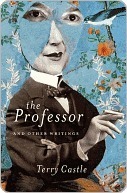What do you think?
Rate this book


340 pages, Hardcover
First published January 19, 2010
I think of Jeff as someone who had no language, or no language other than brutality. Not that he couldn’t read or write, on a primitive level. One of the strangest things about his death were some crude letters—presumably sent back and forth between him and another Marine—that turned up in a closet afterwards. They could only be described as billets-doux—but sick, obscene ones. Full of things like, I going to fuck you cunt, you fucking cunt, suck my dick, scrawled in pencil. My mother told me all about them once, how upset Turk [her stepfather] had been. Turk himself idolized other men but his homoeroticism was sentimental and unconscious. He was diabetic and short and had soft, bosomy breasts. He didn’t like taking his shirt off. He used to say he wanted to kill all the fags. (He politely pretended not to know about me.) The happiest time in his life had been when he was under the North Pole for months in a nuclear submarine. It was so hot and claustrophobic down there, he said, he and the other guys spent most of their time in their skivvies, and sometimes even polished the torpedoes in the nude.
The Sarajevo obsession revealed itself early on: in fact, inspired the great comic episode in this brief golden period. We were walking down University Avenue, Palo Alto’s twee, boutique-crammed main drag, on our way to a bookshop. Sontag was wearing her trademark intellectual-diva outfit: voluminous black top and black silky slacks, accessorized with a number of exotic, billowy scarves. These she constantly adjusted or flung back imperiously over one shoulder, stopping now and then to puff on a cigarette or expel a series of phlegmy coughs. (The famous Sontag ‘look’ always put me in mind of the stage direction in Blithe Spirit: ‘Enter Madame Arcati, wearing barbaric jewellery.’) Somewhat incongruously, she had completed her ensemble with a pair of pristine, startlingly white tennis shoes. These made her feet seem comically huge, like Bugs Bunny’s. I half-expected her to bounce several feet up and down in the air whenever she took a step, like one of those people who have shoes made of ‘Flubber’ in the old Fred McMurray movie.
She’d been telling me about the siege and how a Yugoslav woman she had taken shelter with had asked her for her autograph, even as bombs fell around them. She relished the woman’s obvious intelligence (‘Of course, Terry, she’d read The Volcano Lover, and like all Europeans, admired it tremendously’) and her own sangfroid. Then she stopped abruptly and asked, grim-faced, if I’d ever had to evade sniper fire. I said, no, unfortunately not. Lickety-split she was off – dashing in a feverish crouch from one boutique doorway to the next, white tennis shoes a blur, all the way down the street to Restoration Hardware and the Baskin-Robbins store. Five or six perplexed Palo Altans stopped to watch as she bobbed zanily in and out, ducking her head, pointing at imaginary gunmen on rooftops and gesticulating wildly at me to follow. No one, clearly, knew who she was, though several of them looked as if they thought they should know who she was.